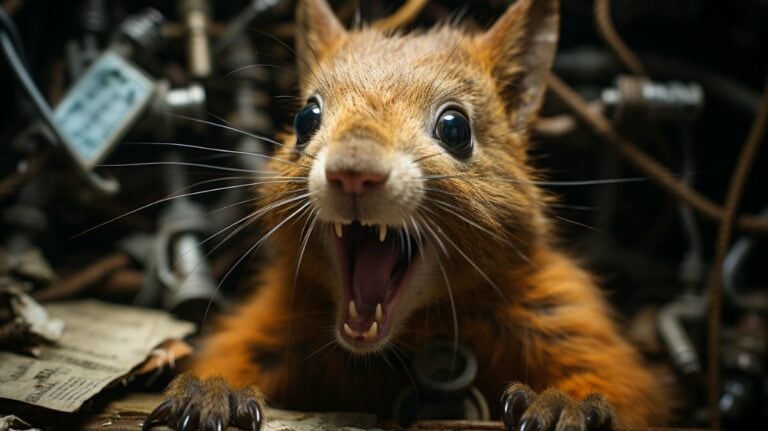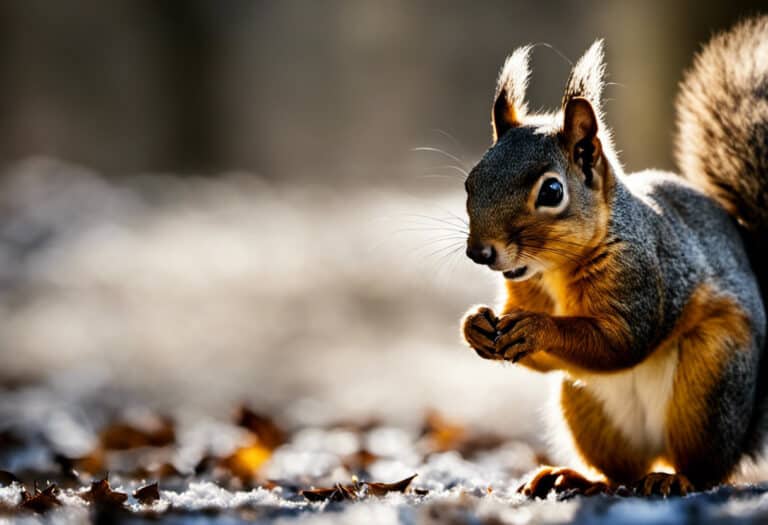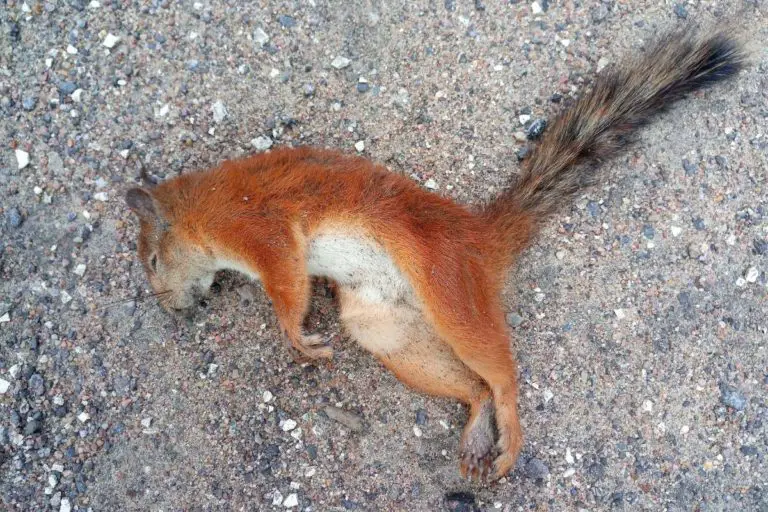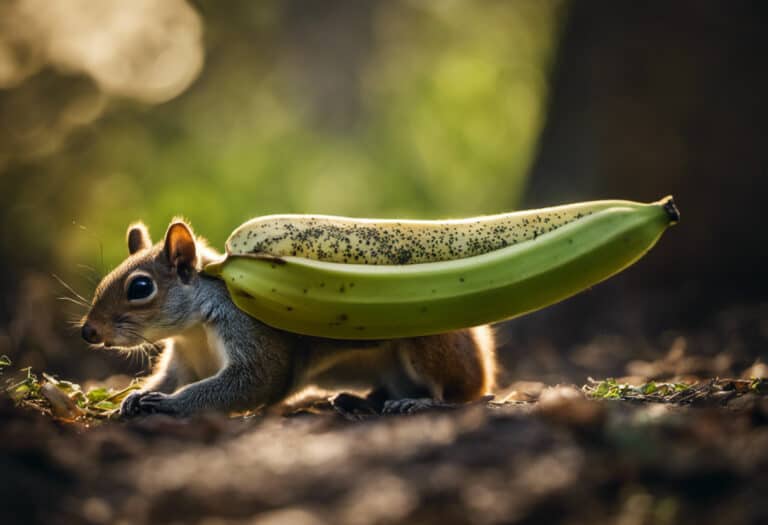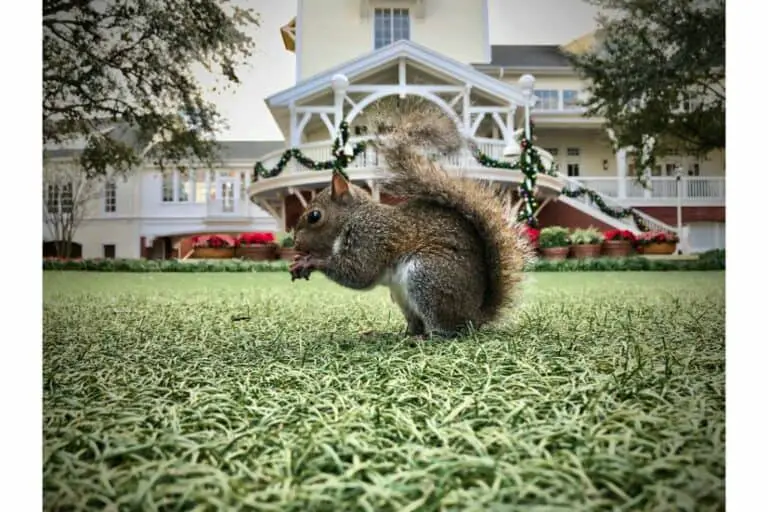Can Squirrels Eat Carrots?
Do you ever wonder if squirrels can enjoy the delicious crunch of carrots? Well, the answer is yes!
Carrots are not only safe for squirrels to eat, but they also offer essential nutrients like fiber, beta-carotene, and antioxidants. These nutrients contribute to the overall health and well-being of squirrels.
Plus, munching on carrots helps keep their teeth clean and healthy.
So, to attract squirrels to your yard or garden, consider placing some carrots out for them to enjoy.
Let’s explore squirrels’ safety, health benefits, and preferences regarding eating carrots.
Key Takeaways
- Carrots are safe and healthy for squirrels to eat.
- Carrots provide essential nutrients like fiber, beta-carotene, potassium, and antioxidants for squirrels.
- Carrots help maintain squirrels’ dental health and aid in digestion.
- Squirrels have different preferences, but many enjoy eating carrots due to their nutritional value.
The Nutritional Value of Carrots for Squirrels
Carrots offer squirrels essential nutrients like fiber, beta-carotene, potassium, and antioxidants to support their health. These nutrients play a vital role in promoting proper squirrel behavior and well-being.
Fiber helps in maintaining a healthy digestive system and prevents constipation. Beta-carotene is converted into vitamin A, essential for vision and growth. Potassium supports proper muscle function and helps maintain a healthy heart rhythm. Antioxidants protect the squirrel’s body from harmful free radicals and reduce the risk of diseases.
To prepare and serve carrots for squirrels, it’s best to cut them into small pieces to prevent choking. Raw carrots can be a crunchy snack, while cooked carrots can be mashed or pureed for easier consumption. Always provide fresh, clean water alongside carrots to keep squirrels hydrated.
How Carrots Benefit Squirrels’ Health
Including carrots in your yard or garden can attract squirrels and give them essential nutrients for their health. Carrots aren’t only safe for squirrels to eat and offer numerous health benefits. They’re rich in fiber, beta-carotene, potassium, and antioxidants, which contribute to squirrels’ well-being.
Moreover, carrots help keep squirrels’ teeth clean and healthy, promoting dental health. To incorporate carrots into a squirrel’s feeding routine, you can place them in a designated feeding area or scatter them around your yard. Cutting up raw carrots into small pieces for easy consumption is recommended.
While squirrels may have preferences, many enjoy eating carrots due to their nutritional value. So why not provide these crunchy treats for your furry visitors and help support their dental health?
Safety Tips for Feeding Carrots to Squirrels
To ensure the safety of feeding carrots to your furry visitors, it’s recommended to cut them into small pieces for easy consumption. This reduces the risk of choking and promotes the squirrels’ dental health. Carrots provide essential nutrients like fiber, beta-carotene, potassium, and antioxidants, which help keep their teeth clean and healthy.
You can attract squirrels to your yard or garden by placing carrots outside. Squirrels have different preferences, so while some enjoy carrots, others prefer nuts. However, carrots are attractive to many squirrels due to their nutritional value.
Understanding Squirrels’ Preference for Carrots
If you want to attract squirrels to your yard or garden, offering small pieces of carrots can be a great option. Carrots are safe for squirrels to eat and provide essential nutrients like fiber, beta-carotene, potassium, and antioxidants.
Incorporating carrots into squirrel feeding stations can help maintain their dental health and contribute to their overall well-being. While some squirrels may prefer nuts over carrots, many enjoy eating carrots due to their nutritional value.
Additionally, carrots can be used as a natural squirrel repellent by placing them strategically in your garden to deter squirrels from damaging your plants.
Providing a diverse and nutritious diet that includes carrots can attract squirrels and promote their health and happiness.
| Pros of Feeding Carrots to Squirrels | Cons of Feeding Carrots to Squirrels |
|---|---|
| Carrots provide essential nutrients | Not all squirrels may like carrots |
| Carrots help maintain dental health | Some squirrels prefer nuts over carrots |
| Carrots attract squirrels to your yard or garden | |
| Carrots can be used as a natural squirrel repellent. |
Exploring Squirrels’ Diet Beyond Carrots
Now that you understand squirrels’ preference for carrots let’s explore their diet beyond this popular vegetable.
Squirrels are omnivores, and their diet consists of diverse foods. They consume nuts, berries, fruits, vegetables, and insects, including mealworms, crickets, moths, grubs, and caterpillars.
Other vegetables like celery, cucumbers, and lettuce can also be part of a squirrel’s diet, providing them with a wide range of food sources.
Other Squirrel-Friendly Vegetables
Include a variety of vegetables like cucumbers, zucchini, and peas in your squirrel’s diet to ensure a diverse and nutritious meal plan.
Here are some other squirrel-friendly vegetables that you can add to their diet:
- Leafy greens such as lettuce and cabbage: These vegetables provide essential vitamins and minerals for squirrels.
- Sweet potatoes and corn: Squirrels enjoy these vegetables’ taste and provide additional nutrients.
Incorporating a variety of vegetables into a squirrel’s diet is essential for their overall health and well-being. These vegetables offer different nutrients and flavors, ensuring a balanced diet for squirrels.
It’s important to note that while vegetables are a valuable addition to a squirrel’s diet, they shouldn’t be the sole source of nutrition. Nuts, fruits, and other food sources should also be included to meet their dietary needs.
Importance of Dietary Diversity
To ensure your squirrel’s overall health and well-being, it’s crucial to incorporate a diverse range of foods into their diet.
The importance of variety in squirrel diets can’t be overstated. Dietary diversity has a significant impact on squirrel health, providing them with essential nutrients and promoting optimal functioning of their bodies.
When squirrels have access to a wide array of foods, they receive a balanced mix of vitamins, minerals, and antioxidants that support their immune system, promote digestion, and aid in maintaining their dental health.
Including various nuts, fruits, vegetables, and insects in their diet ensures that squirrels receive the necessary nutrients for growth, energy, and overall vitality.
Balancing Nutrition for Squirrels
Ensure your furry friends eat a balanced diet by incorporating various nutritious foods. Regarding squirrels’ dental health, incorporating carrots into their diet can be beneficial.
Carrots provide essential nutrients like fiber, beta-carotene, potassium, and antioxidants that contribute to squirrels’ overall health and well-being. They also help keep their teeth clean and healthy.
Feeding squirrels carrots is safe and healthy, as they’re a safe and nutritious food option. However, cutting up raw carrots into small pieces for squirrels is recommended. Remember, squirrels have different preferences, so not all may like carrots.
Including carrots and other vegetables like celery, cucumbers, and lettuce can ensure a diverse and nutritious diet for squirrels.
Squirrels’ Eating Habits and Carrots
You may wonder about squirrels’ eating habits and preference for carrots.
Squirrels are omnivores with a diverse diet, and while nuts and seeds form the bulk of their nutrition, they also enjoy fruits and vegetables like carrots.
Carrots provide essential nutrients for squirrels and can be easily dug up from gardens, making them an attractive food source for these furry creatures.
Squirrel Carrot Preferences
Suppose you’re wondering about squirrels’ preferences when it comes to food. In that case, it’s important to note that while many squirrels enjoy eating carrots due to their nutritional value, some may prefer nuts over carrots.
When it comes to protecting your gardens from squirrels, there are a few strategies you can employ. Here are some tips to keep in mind:
- Install a fence around your garden to prevent squirrels from accessing your plants.
- Use netting as a protective barrier to keep squirrels away from your crops.
- Consider using scented deterrents like garlic or peppermint oil to discourage squirrels from entering your garden.
- Try ultrasound deterrents that emit high-frequency sounds to disorient squirrels and make them uncomfortable.
- Visual deterrents like shiny wind chimes or fake predators can also help deter squirrels.
Nutritional Benefits of Carrots
Carrots are nutritious to a squirrel’s diet, providing vitamins and minerals that contribute to their overall health and well-being.
These orange root vegetables contain essential nutrients like fiber, beta-carotene, potassium, and antioxidants. Not only do carrots aid in digestion and help move food through the digestive system, but they also play a role in maintaining squirrels’ dental health.
Incorporating carrots into squirrel feeders can attract these critters to specific areas, making observing and studying their behavior easier. Interestingly, while carrots appeal to most squirrels, they can also be used as a natural repellent when strategically placed to deter them from specific areas.
Other Suitable Vegetables for Squirrels?
Include a variety of vegetables like cucumbers, zucchini, peas, lettuce, cabbage, sweet potatoes, corn, broccoli, and cauliflower to ensure a diverse and nutritious diet for squirrels.
- Vegetables provide essential nutrients for squirrels, contributing to their health and well-being.
- Leafy greens like lettuce and cabbage are rich in vitamins and minerals.
- Sweet potatoes and corn offer a good source of carbohydrates for energy.
- Feeding squirrels a mixture of vegetables ensures they receive a balanced diet.
- Broccoli and cauliflower provide additional vitamins and fiber.
- Peas are high in protein and can be a valuable addition to their diet.
Understanding squirrel feeding habits and incorporating a variety of vegetables can help meet their nutritional needs.
Effective squirrel deterrents such as installing fences, using netting, scented deterrents, or ultrasound devices can protect your garden from these agile creatures.
Protecting Your Garden From Squirrels
To protect your garden from squirrels, you can implement various preventive measures.
One option is to install a fence or use netting as a barrier. This physical barrier creates a deterrent that prevents squirrels from accessing your garden.
Another effective method is to use scented deterrents such as garlic or peppermint oil. These strong-smelling substances repel squirrels and discourage them from entering your garden.
Ultrasound deterrents are another option. These devices emit high-frequency sound waves that disorient squirrels and discourage them from entering your garden.
Visual deterrents can also be employed to scare away squirrels. Shiny wind chimes or fake predators can create a deterrent effect and keep squirrels at bay.
The Nutritional Benefits of Carrots for Squirrels
You can ensure that squirrels receive essential nutrients by incorporating carrots into their diet. Carrots provide hydration for squirrels and play a crucial role in preventing dental issues. Here are some key points to consider:
- Hydration for Squirrels
- Carrots contain a high water content, making them an excellent source of hydration for squirrels.
- Squirrels can obtain moisture from carrots, especially during dry seasons when water sources may be limited.
- Preventing Dental Issues
- Chewing on carrots helps to wear down squirrels’ teeth, preventing overgrowth.
- Carrots’ crunchy texture stimulates saliva production, which helps to clean squirrels’ teeth, reducing the risk of dental problems.
Other Vegetables Suitable for Squirrels’ Diet
Corn, broccoli, and cauliflower are suitable vegetables for a squirrel’s diet. These vegetables provide additional nutrients and variety to their diet, which is essential for their health and well-being.
When introducing new vegetables to a squirrel’s diet, it’s essential to do so gradually. Start by offering small amounts of fresh vegetables alongside their regular food. Observe their response and monitor for any adverse reactions. If the squirrel shows interest and tolerates the new vegetable well, you can gradually increase the amount over time.
It’s also important to note that squirrels have different preferences, so not all may enjoy these vegetables. It’s always best to provide diverse food options to ensure a balanced diet for squirrels.
Frequently Asked Questions
Can Squirrels Eat Carrot Tops or Just the Carrots Themselves?
Squirrels can eat both carrot tops and carrots themselves. Carrot tops have nutritional value, providing vitamins and minerals. Some squirrels may enjoy eating carrot tops, while others prefer carrots.
Are There Any Potential Health Risks or Allergies Associated With Squirrels Eating Carrots?
There are no potential health risks or allergies associated with squirrels eating carrots. Carrots are safe and nutritious for squirrels, providing essential nutrients without causing harm. They are a beneficial addition to a squirrel’s diet.
How Often Should Carrots Be Included in a Squirrel’s Diet for Optimal Nutrition?
Including carrots in a squirrel’s diet can provide optimal nutrition. They are rich in essential nutrients like fiber, beta-carotene, potassium, and antioxidants. However, it’s necessary to offer a variety of vegetables as alternatives to ensure a diverse and nutritious diet for squirrels.
Are Any Specific Varieties of Carrots Better for Squirrels Than Others?
Certain varieties of carrots may appeal more to squirrels due to their taste and texture, but there isn’t scientific evidence to suggest that squirrels have specific preferences. It’s best to offer a variety of carrots to meet their nutritional needs.
Can Squirrels Eat Cooked or Steamed Carrots, or Do They Need to Be Raw?
Cooked or steamed carrots can be fed to squirrels, but raw carrots are preferred. However, ensure they are cut into small pieces. Carrots provide nutritional benefits like fiber, beta-carotene, potassium, and antioxidants for squirrels.
Conclusion
In conclusion, squirrels can safely consume carrots and benefit from their nutritional value. Carrots provide essential nutrients such as fiber, beta-carotene, potassium, and antioxidants, contributing to squirrels’ overall health and well-being.
Additionally, carrots help keep their teeth clean and healthy. While some squirrels may prefer nuts, others enjoy munching on this vibrant orange vegetable. Placing carrots outside can attract squirrels to your yard or garden.
Understanding squirrels’ dietary preferences and providing a variety of foods can ensure their health and enjoyment.
